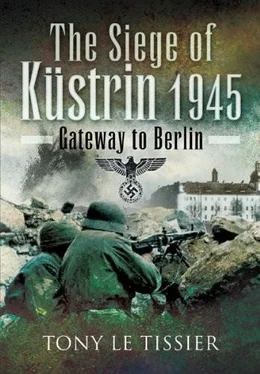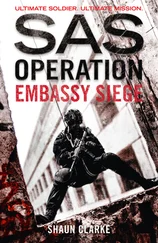The town of Küstrin is a single heap of rubble. The buildings have been shot through, burnt out and those burnt walls still standing shot through yet again. There is not a single Küstrin family that will find the smallest item of their personal goods again. Certainly Küstrin fortress has shown itself worthy of its great historical past in this war. Only when the town was completely shot up, when the ammunition and food stocks were destroyed and there was no chance of holding on any longer did the troops assemble for a breakthrough battle. When one thinks that during the days and weeks beforehand all the men had become tired and burnt out, the breakthrough battle was a unique performance that deserves recognition. SS-Gruppenführer Reinefarth gave the order to break through at the last minute, making a decision that was fully justified. He did what a responsible and self-confident leader must do in such a situation. Metaphorically speaking, there were only two possibilities. Either the fortress held on for another 20 minutes and then surrendered defenceless to the Bolshevik soldiers, or, taking the last of the ammunition, the men broke out and thus, despite the expected losses, several hundred men were saved for the German front. In the troops’ opinion, the garrison should have been taken out through the ‘pipeline’ as soon as Kietz and the Neustadt were lost, to establish a new Oder front west of Küstrin, which would have saved about 3–4,000 men at no great cost.
It will be understood that one simply cannot accept or believe that any earnest attempt was made to relieve Küstrin. If one had been made, then it is at least astonishing that several divisions with fresh, rested soldiers with tanks and heavy weapons were not able to do what the fought-out and tired fortress garrison of Küstrin achieved in the opposite direction with just a few small arms. There are few fortresses that could hold out for ten weeks against such superior forces.
To finish my report, I would like to make an observation that perhaps would not be unimportant in the continuation of the war. First, the question of why it is that the soldier breaks down so often and runs away. I have only one explanation for it, and that is the lack of good officers who not only lead in a military sense but also establish a close comradely relationship with their men. The men [in Küstrin] were all completely exhausted and weary from week-, month- or year-long fighting. They daily experienced the enemy’s superiority in weapons and manpower and were losing confidence in their own resources. They had reached an emotional state in which nothing mattered any more. Although it is not allowed in such a tense situation, one might survive if one were at least allowed to have some leave in limited circumstances. When that is impossible, a solution for the fighting troops should constantly be looked for. A unit after a week’s fighting in the forward area should earn a week’s rest in a rear area. One still sees full garrisons in the country, so such an exchange of soldiers should be possible. A unit that has been able to sleep comfortably for a week and has had its clothing and weapons repaired and even some training, returns refreshed into battle. Old First World War soldiers often told me that they had never experienced units fighting and fighting until they finally died. For instance, during those ten weeks in Küstrin perhaps a third of the troops could have been stood down. Certainly it was necessary to have a large proportion of the troops familiar with the local terrain remaining in place. It was the same with the Volkssturm in Küstrin. Much of their accommodation was full of lice because they had no change of clothing, which made them dirty and consequently unhappy and discouraged. They could have been brought back once every so often to have a good sleep, sort out their clothing and above all have a good wash and even get half a day’s training. These troops would certainly be valuable in the further fighting. Here is an example:
I crawled up to a soldier who was on sentry duty in a foxhole on the Warthe, and so on the front line. I tried to have a chat with him, as in other such cases, but he would hardly say anything. When I asked him what his task was, he still remained silent. I must accept that perhaps my brown uniform put him off. He stared at me stupidly. When I finally offered him a cigarette and then got closer to him and asked how long he had been on sentry duty, he answered since early yesterday. He had been on duty for a day and a half without being relieved. He was completely exhausted, overtired and half asleep. Such a soldier cannot do much if the Russians should really come. This case was reported by me and investigated further.
One always had the impression that those who are really able, if they are unassuming and do not like putting themselves in the limelight, make little progress in the Wehrmacht. Those holding positions on the staff often have high decorations, but act very pompously and boastfully in their manners and appearance.
Most of the senior officers in Küstrin stemmed from the police. In my opinion, they lacked the tactical knowledge needed for commanding troops that the majority of the Wehrmacht officers had learnt on their way up through the ranks. When they belong with the competent officers, then they should wear Wehrmacht uniform. For the Wehrmacht, especially the officers, it must have been sickening to be commanded by police officers. The battle commander in the Neustadt was Police Colonel Walther, and in the Altstadt, Police Major Kulla. While they knew each other well, they had naturally filled other officer posts in their sectors with police officers. In the current situation it is important, without regard to the body one belongs to, to put the most able men in the right place; in this case, they should have donned Wehrmacht uniform and set aside their police ones.
Often very young SS officers were allotted posts that other officers of the Wehrmacht had to step aside for. An 18-year-old SS second lieutenant had, for example, to lead a combat group that included Wehrmacht and Flak captains and lieutenants. These officers were not only old enough to have been the fathers of this SS second lieutenant, but even gave the impression that they possessed ability well above that of the SS officer set over them. Most of these young SS officers were daring types, not weaklings, and certainly engaged bravely in every situation. However, such men should be given special assignments for which they are better suited. Appointments for which knowledge, and not least experience, are required belong, however, to other people. Here is an example:
A fire threatened to spread across from a neighbouring building. This was reported to the SS second lieutenant. He immediately ordered the building to be blown up. When the NCO reported that there was clothing in the cupboards and washing hanging around that someone must have brought there, he ordered the building to be demolished a second time. The NCO came back again and reported that about 70 soldiers who used the cellars were at the moment in action, but all their property, packs, clothing, etc. was lying around in the cellars. The NCO was reprimanded and was told once more to blow up the building. Only a few minutes perhaps would have been necessary for a few men to remove these soldiers’ items. Apart from this the fire was in no way so far advanced that the demolition was so urgent. The order had been given without any consideration whatsoever by a young man who had surely never had to buy underclothes with his own money. Thank God the soldiers in this situation were much more sensible and saved their comrades’ things before blowing up the building.
The soldiers’ lack of fighting spirit was also illustrated in the way that they always quickly let themselves be disarmed. We often went into the cellars when there was a smell of burning with a pistol in the hand to winkle out skivers. It was sufficient with two or three men to round up groups of eight to nine men, who timidly obeyed and willingly dropped their rifles, belts and steel helmets. I collected up many weapons for the Volkssturm in this way with my Party comrades and caught cowardly soldiers. When Gauamtsleiter Party Comrade Dame came to Küstrin and I told him, he did not want to believe it. I suggested that he tried it himself. Party Comrade Dame, who was in civilian clothes, rounded up six soldiers who had fled to the Altstadt from the Neustadt. There was a short interrogation and then Dame forcefully demanded that the soldiers immediately lay down their rifles, belts and steel helmets. All six soldiers obeyed and were apparently pleased to be without their weapons. If a single German civilian can so overwhelm six soldiers, what would happen when these soldiers were confronted by Russians? Whether this failing morale can be restored, I do not know. However, what is possible in my opinion, is that by continually relieving those soldiers who are weary, tired and grown apathetic with the fighting, one can give them back an inner equilibrium before they are sent back into battle, and advise them of the urgency and significance of their fight.
Читать дальше












